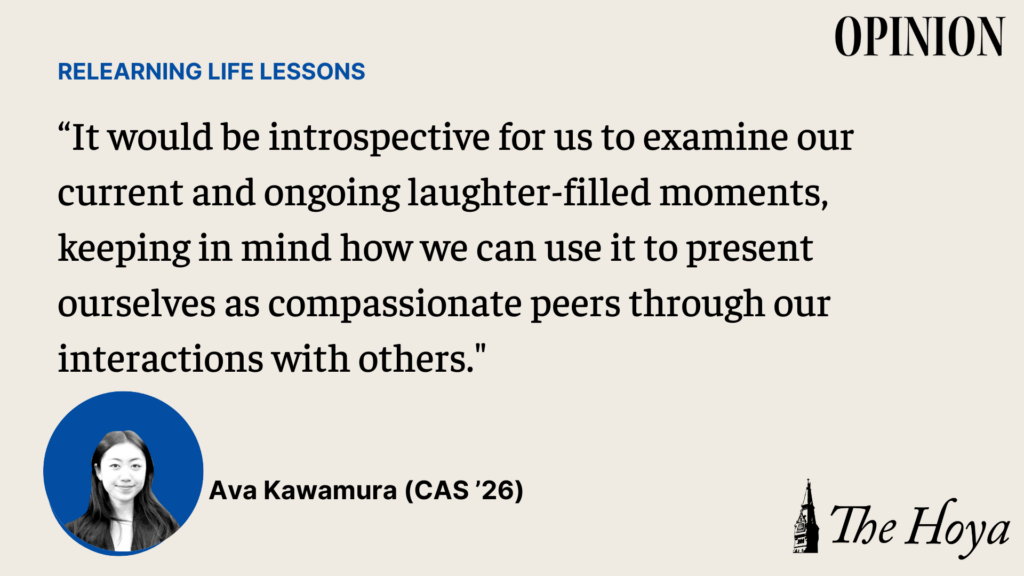People often advise others to follow certain “life lessons” as they navigate their encounters and relationships. From “good things come to those who wait” to “don’t judge a book by its cover,” such phrases risk becoming cliches after too many repetitions. It is only through lived experience that we can begin to evaluate the underlying nature of these lessons, and whether or not they hold true in bettering our lives as Georgetown students.
The saying “laughter is the best medicine” suggests that laughter can always be applied in a positive manner, irrespective of context. Put simply, laughing seems to equate to pure happiness, implying a reaction to something that was impactful enough to elicit such a joyful response.
As I think back on moments of laughter that I’ve observed on campus, I wonder if “happiness” is always the emotion evoked. In my personal experience, it sometimes carries a negative connotation, depending on the circumstance.
For example, sharing a laugh with friends over a comedy show differs greatly from hearing laughs as you struggle to speak during a class presentation. Rather than stirring a sense of warmth, the latter is neither joyful nor enjoyable. With this comes an important distinction between laughing with someone and laughing at someone, a distinction that teeters between empathy and antipathy. It is in the best interest for us, our peers and Georgetown University’s community to recognize that laughter can only be interpreted through its context. Ultimately, we must be mindful of the varying feelings that it evokes in each situation.
Last semester, I observed one of my professors struggle to use the classroom’s projector. In a large lecture hall, with well over 100 watchful students, he would pause for many silent and agonizing moments to re-adjust his screen, only to unknowingly select the wrong tab or article. In that instance, what struck me was that rather than pointing this out to him, a few students would quietly laugh at the sight of him referencing a slide that was nowhere to be seen. No one offered to help.
In this context, laughter was not an indication of the appropriate, joyful response that the cliche phrase above suggests. Rather than instilling a sense of happiness, it hardened a collective’s underlying indifference towards an individual’s lone struggle. While my professor never let on that he had noticed the laughs, it’s hard to imagine that he didn’t hear it in an otherwise silent room. In moments like these, it appears that laughter can reinforce a certain marginalization of the intended victim — a lack of empathetic consideration for those around us.
I noticed a similar experience last semester while at dinner with a group of friends. That night, one person made a facetious comment about my friend’s — an international student present at the table — home country. After hearing someone joke about a sensitive, common stereotype regarding their culture, my friend laughed it off and changed the subject. But there was a trace of discomfort beneath her laugh that arose from an uncertainty of how to respond. Upon checking in with her afterwards, I learned that the instinctive reaction was more hesitant than joyful.
What was outwardly expressed by my friend was not a sign of happiness. Instead of making her feel better, her laugh was an awkward attempt to redirect away from a moment of disconcertment.
That being said, there are certainly contexts in which laughter can truly be the “best medicine.” In a different class, one of my professors shared a lighthearted anecdote about her son and his free-spirited nature. As my classmates and I listened to her joke about his unrelenting energy, our laughter carried an altogether different sensation. Rather than symbolizing a lack of empathy or recognition, it served as a foundation for fostering more personal connections within one’s community.
In this case, laughter posed a greater opportunity for us to not only learn more about our professor, but to bond as classmates while feeling a unique solidarity through joy. When mutually shared, our laughs were able to establish a comfortable, supportive and communal environment that ultimately enriched our learning experience for the rest of the semester.
All of this is not to say that laughter is the only path to build deeper campus connections, or that it does greater harm than good. Rather, it would be introspective for us to examine our current and ongoing laughter-filled moments, keeping in mind how we can use it to present ourselves as compassionate peers through our interactions with others.
Ava Kawamura is a first-year student in the College of Arts and Sciences. Relearning Life Lessons is published every third Friday.














